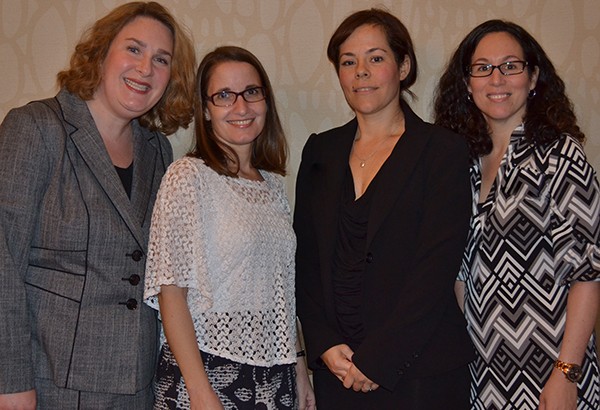
Rosie Anaya’s Work in The Aitken Family Violence Clinic at Chapman is Recognized by the OCFJC Foundation
October 15, 2013
At the
Orange County Family Justice Center Foundation
Anniversary Luncheon on October 3, Chapman’s Rosie Anaya was recognized for her work helping survivors of domestic violence through the Bette and Wylie Aitken Family Violence Clinic.
Rosie began working at the Aitken Family Violence Clinic at Chapman University in 2008, and she has since served as the first point of contact for survivors seeking help. When clients reach out to the clinic, Rosie goes above and beyond to ensure that each survivor is cared for, listened to, and that action is being taken. In a situation such as domestic violence, survivors are often traumatized and when kind-hearted people like Rosie enter their lives it makes the road to recovery a little easier.
“Working at the Bette and Wylie Aitken Family Violence Clinic offers me the unique opportunity to work alongside a wide variety of people and organizations like police departments, victim advocates, therapists, social services, and prosecutors”, said Rosie. “It’s an honor working with compassionate, inspiring, and influential Professors like Marisa Cianciarulo, Wendy Seiden, and Julie Marzouk. The work that I see them do for the clients inspires me and makes me proud to be a part of the clinic.”
Because of her dedication to breaking the cycle of domestic violence, Rosie received the 2013 OCFJC Individual Onsite Contributor Award.
About the Bette and Wylie Aitken Family Violence Clinic:
The Bette and Wyle Aitken Family Violence Clinic was established in 2007 at Chapman University to provide no-cost legal services to survivors of domestic violence. Every year, approximately 25 law students take part in the Aitken Family Violence Clinic, receiving intensive academic training in client interviewing and counseling, the dynamics of family violence, and either trial skills or legal writing. The Clinic is directed by Professor Marisa Cianciarulo, a specialist in clinical teaching and immigration law with a focus on human rights. “I feel it is crucial to the learning process to allow students to run the show, with my supervision. The amount of student effort is actually dictated by the needs of the client, not a per-week hourly requirement. Students become very attached to the clients and their cases, and they are struck at how much of role they can play in a person’s life,” said Professor Marisa Cianciarulo.
The Aitken Family Violence Clinic served approximately 200 survivors of domestic violence last year. Once in a shelter or other safe environment, victims need additional legal services such as permanent restraining orders, divorce, and child custody orders, and financial counseling.
“Working in a clinic is unique because it provides the opportunity to see what you have spent hours preparing for, by reading and sitting in a classroom, in action,” said Chapman law student Michelle Standfield (’14). “After my first year of law school, I don’t think I understood what practicing the law really entailed. I just don’t think a classroom can prepare you for that. For me, the law came alive in the clinic, providing texture and color to what had previously been on a page in black and white.”
In a recent victory, our law students helped a victim of domestic violence who was living in the United States on a marriage visa. The victim was escorted to a shelter and referred to the Aitken Family Violence Clinic for help. Our students worked with the victim, listened to her story, gathered evidence of the abuse that she and her son suffered, and ultimately filed a petitioner for relief though the federal Violence Against Women Act. She and her son are now legally living in this country, safe and far away from her attacker. She is legally employed and her son is happy, healthy and in school.
To learn more about the Aitken Family Violence Clinic, follow this link. If you would like to support the work of the Aitken Family Violence Clinic, please consider making a donation.


